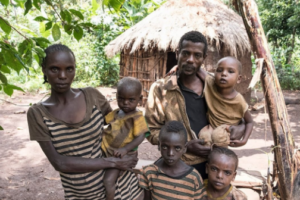Dr. Tsegaye Degineh has been working for Daimler for nineteen years. The native Ethiopian works as Diversity Officer at Mercedes-Benz Wholesale Germany and is responsible for human resource communication. During his last visit to his old home country, he planted trees on his own initiative to contribute to the reforestation of Ethiopia. In an interview, he told us why this is not as easy as it might seem at first.
Mr. Degineh, what inspired you to plant trees in Ethiopia?
For years, I have been a volunteer in the International Ju-Jitsu Federation and in judo sports. The focus of my engagement is teaching values in sport and transferring knowledge in the field of development economics between Germany and Ethiopia. This has resulted to a great number of contacts. In October 2018, for example, I was able to accompany the Nobel Peace Prize winner and Prime Minister of Ethiopia, Abiy Ahmed, at the “Compact with Africa” G20 Summit in Berlin. At his initiative, 350 million tree seedlings were planted in the country within twelve hours in summer 2019 – which is winter in Ethiopia. Between 1960 and 2012, construction projects and deforestation had reduced the forest cover in Ethiopia from 37 to three percent of the country’s land.
This action inspired me to plant trees during one of my visits to Ethiopia. I already dealt with the topic of sustainability during my studies. As a research assistant in a working group at the Department of Resource Economics, I did research on how rights of use influence the environment.
“In Africa there is a saying: The best time to plant a tree was 20 years ago. The second best is today.”
Tsegaye Degineh
Is it possible to plant trees in Ethiopia just like that?
That would be nice, but no. It was a long way with many official consultations until we broke ground. Because of the dry season, for example, it was quite difficult to find a suitable location. Finally, we were allowed to plant 40 trees at a planned sports facility. However, since the location was unsuitable for trees, in the end we planted 20 bushes. However, that was not enough for us. After further consultations, we were allowed to plant more trees along a new highway – a very suitable place to immediately reduce CO2 emissions.
That sounds like a lot of work. Did you have help with that?
My family was there with me and helped me to plant the trees. The road administration kindly provided us with the necessary equipment. They will also take care of the regular watering in the future. My colleagues at Daimler also supported me. They were so enthusiastic about my project that they donated about 250 EUR for seedlings. The trees that have been planted are now labelled with their names. However, there was some money left over. I donated this to an initiative that ensures that schools can distribute hygiene articles to girls.
Could you imagine planting trees in Germany too?
Basically, yes. However, my help is needed more urgently in Ethiopia. Because trees provide shade from the hot sun, filter a lot of CO2 from the air, keep the ground moist and are able to resist erosion and the advance of the desert, they are particularly effective and important in Ethiopia. In general, I think that taking responsibility in any form is a great feeling.
How sustainable is your private life?
I try to pay attention to small things and make a difference. That is why we use green electricity at home and try to avoid disposable plastic. When I came to Germany 30 years ago, I was surprised to see how people wasted resources such as packaging material or plastic bottles. We use reusable shopping bags, drink tap water or bubble water ourselves and buy regional organic food if possible. We have a little garden in which we try to grow our own fruit and vegetables. We use used envelopes and misprints as scrap paper. Besides, my next car will probably have an electric drive.




